Plastic not so fantastic? The debate continues…
23rd January 2020
The Circular Economy Task Force

For the last 18 months SUEZ has been active an member of the Circular Economy Task Force – a business group convened by the Green Alliance as a forum for policy discussion, innovation and business thinking around resource use in the UK.
The Group is chaired by Dr. Colin Church, Chief Executive of IOM3, and the members include Kingfisher, Viridor, Walgreens Boots Alliance, Veolia and us at SUEZ recycling and recovery UK. Former members have included Unilever, Kyocera, WRAP and BASF, and the impact of the group and its formidable output should not be underestimated.
SUEZ recycling and recovery UK joined this influential ‘think tank’ in 2019 as the goals relating to resource efficiency, the circular economy, recycling quality and better system design firmly align with the thinking and progress being made at SUEZ, both in the UK and wider afield.
Since its establishment, the task force has produced a number of hard-hitting reports, which have captured the media’s attention and at times have also ‘rattled’ government thinking, which has always been a key intention for the group. Some of these reports have helped to shine a light on downfalls in current policy frameworks, markets and systems, whilst others have raised more questions than answers about what is going wrong in our resource use. Some of my favourites include;
- Resource resilient UK identified the barriers to business becoming not only more resilient, but also more profitable and sustainable through better resource productivity, helping the UK to increase its overall resource security
- Wasted opportunities discussed how addressing the UK’s broken recycling system could deliver higher value reprocessing leading to more valuable remanufacturing and redesign
- UK resource governance for the 21st century highlighted the risks that the UK’s poor performance in improving resource security and productivity posed to businesses in the UK and analysed potential solutions
- A new direction for UK resource strategy after Brexit looked at how Defra could manage the divergence from existing EU waste and resource governance and create new policies, targets and priorities post-Brexit
- Completing the circle placed a spotlight on the amount of material often lost to the economy once collected and which proposed new measures to complement recycling targets which would help to ‘pull’ these materials back into use in manufacturing.
The task force continues to research the policy solutions to enable businesses to make the necessary changes for the delivery of a more circular economy, one that optimises the UK’s resource use. It is worth noting that some of the recommendations of the task force were picked up by the UK’s Environmental Audit Committee’s Growing a circular economy report, and by the Scottish government’s Resource Use and the Circular Economy inquiry.
The plastics debate – one step forward, two steps back
In keeping with the themes of ‘challenge, deep thinking and helping to nudge forward the key debates’ the last 12 months has seen no let-up of activity for the task force, with the decision to focus on plastics.
So, after several months of open discussion between members, the decision was taken that 2019 and 2020 would focus on moving beyond the then current plastics debate – the simple narrative that ‘plastic is bad’ and that other materials should be substituted for it to improve the environmental impacts associated with that product or packaging. After all, those of us working in the sector know it is far more complicated and nuanced issue than simply asking is plastic ‘good or bad?’
So the work stream for the 18 month period was set, and six months later, in Summer 2019, a new infographic was published which considered the alternatives to single-use plastic water bottles which are often consumed on the go, and which are one of the most iconic of plastics in modern society.
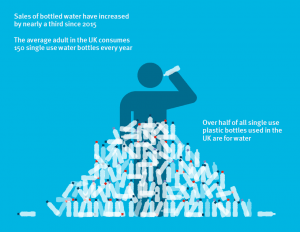 The output ‘Losing the bottle – why we should get rid of all unnecessary single use containers for water’ turned the debate on its head, showing clearly, with robust evidence and discussion that all alternatives to plastic water bottles are not as good as we may have been led to believe, and that the answer to the problem is actually refillable bottles, with all single-use containers being considered unsatisfactory.
The output ‘Losing the bottle – why we should get rid of all unnecessary single use containers for water’ turned the debate on its head, showing clearly, with robust evidence and discussion that all alternatives to plastic water bottles are not as good as we may have been led to believe, and that the answer to the problem is actually refillable bottles, with all single-use containers being considered unsatisfactory.
Aluminium may be infinitely recyclable, but replacing plastic water bottles with aluminium ones would require vast quantities of bauxite mining with massive environmental impacts, whilst switching to glass would increase carbon emissions because of the manufacturing process and the heavier nature of the container and associate transport impacts.
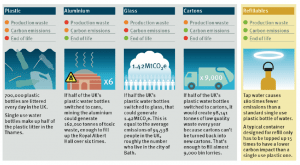
Clearly the question isn’t an easy one, but big brands across the country are grappling with the problem right now, and some have already committed to plastic free aisles, or are switching to a substitute material for some of their lines. The infographic was designed to influence policy makers and consumers alike, which we think it did given the media circus it created, but what would you do given the choice when next in the shopping aisle?
We followed up the infographic release with a number of deep-dive workshops with both members of the task force and stakeholders from across the plastic bottle supply chain – from local authorities and retailers, to reprocessors and campaigners – to see if we could move the dialogue on even further and help inform government thinking about bans, taxes and new extended producer responsibility proposals which are all due out later this year (2020).
This collaborative approach is one of the things that the circular economy task force is known for, and mirrors the approach that SUEZ has taken over the years for dealing with difficult issues. Only last year, we hosted 45 workshops each with a mixed representation of the value chain to try and collectively understand the proposals from government on deposit return schemes (DRS), extended producer responsibility (EPR) and consistent collections.
However, in parallel, the task force started to consider other aspects of plastics and material substitution, including working with retailers, in particular supermarkets, to understand what they are doing about the issue. This work was summarised in the report ‘Plastic Promises – what the grocery sector is really doing about plastics’ which was published in January 2020. Not only did this report clearly set the scene for the level of public concern about plastics, which is higher than ever in the 18-34 year old category, but it also reported back on anonymised interviews with five of the leading UK supermarkets about the pressure they are feeling from their customers concerning plastics and how they are reacting to the challenges being set.
Not only are customer’s concerned about plastics they are also actively choosing to buy products with less plastic packaging.
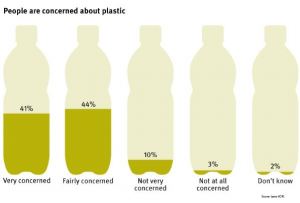
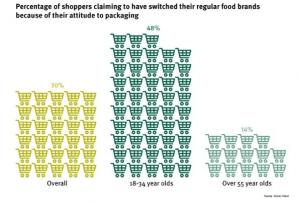
UK supermarkets, including Morrisons, Tesco and Sainsbury’s, have recently switched from single use plastic bags for loose produce and bakery items. For example, some are replacing them with single use paper bags. However, this is a worrying trend, as paper bags, which are often just as unnecessary as their plastic counterparts, can have much higher carbon impacts, though this can depend on material sources and product specification.
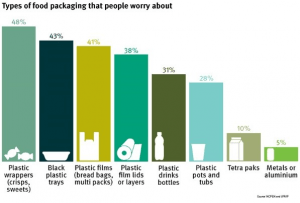
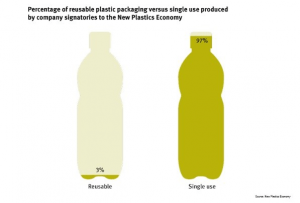
The report also discussed the possibility of confusing consumers with the proliferation of bio-polymers and compostable and degradable packaging now being used in the UK, and residents do not know which to pick and which bin to dispose of them in after use. Yet, 80% of consumers think bio-based packaging is environmentally-friendly. Work is needed to clarify when these should be used and how this will be clearly communicated to consumers. Otherwise, we can expect contamination levels to soar at many of our sites.
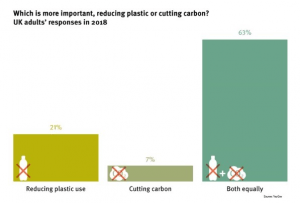 Whilst refillables are not currently considered the ‘whole answer’ right now, some supermarkets are actively promoting it. Loose vegetables and fruit (rather than packaged goods) were in favour of helping consumers go on a journey to a time when refillables become part of the regular shopping experience. But, the unintended consequence of switching away from single use plastic bags several years ago and promoting bags for life has not necessarily had the desired impact with so little of these bags for life being used on any more than a few occasions, resulting in greater overall resource consumption and ultimate loss from the system.
Whilst refillables are not currently considered the ‘whole answer’ right now, some supermarkets are actively promoting it. Loose vegetables and fruit (rather than packaged goods) were in favour of helping consumers go on a journey to a time when refillables become part of the regular shopping experience. But, the unintended consequence of switching away from single use plastic bags several years ago and promoting bags for life has not necessarily had the desired impact with so little of these bags for life being used on any more than a few occasions, resulting in greater overall resource consumption and ultimate loss from the system.
The often-kneejerk reactions of some buyers and brands can cause frustration for recycling companies like SUEZ, as they move away from inherently recyclable packaging types into materials like coated cardboard and composites that are less recyclable and that can have a more negative environmental impact.
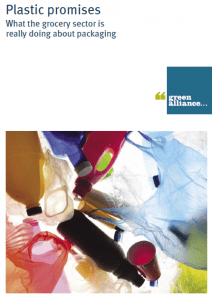
We already work closely with supermarkets and brand owners on recyclability and to align recycling services with their requirements. We will continue to work with brands and retailers to help them make sensible, long-term and pragmatic decisions that will improve resource use, reduce carbon emissions and enable closed-loop recycling to develop further.
The consumer journey is an important aspect of the current plastics debate, and one that the task force is keen for government to embrace. But, with more consumers believing that cutting plastic use is more important than cutting carbon emissions we may have an uphill battle on our hands!
The interviews conducted painted a picture of companies under considerable and justified pressure to change, and many were wary of simply rushing away from plastic towards other single use materials, only to have caused different environmental impacts.
Looking ahead, 2020 and beyond
The task force is keen to help develop an approach that capitalises on the growing public awareness of plastic pollution and starts to address material use more holistically.
As industry, the government and society together decide what to do about plastic pollution, the solutions must address the systemic problems of our throwaway society and avoid the risk of simply substituting current environmental problems with new ones. As such the Circular Economy Task Force is creating some principles that should be followed to help prevent such undesirable changes.
So, the next steps are the completion of the data analysis and modelling tasks and a finalised analysis concerning the wider systemic solutions required to deal with plastics in a modern Britain. We will be working hard on the final report ‘designing a holistic approach to plastic’ and plan to launch it in March 2020, where an outline of some of the steps to reducing negative environmental impacts from all materials, not just plastic will be shared. So watch this space.
But if you are interested in any of the work undertaken so far, or in the ongoing work of the Circular Economy Task Force then please contact me, or Stuart Hayward-Higham, as we are both heavily involved in the group to date and the forthcoming reports.
Tweet- Aluminium
- carbon
- Cartons
- Circular Economy Task Force
- Deposit Return Scheme
- Extended Producer Responsibility
- Glass
- material recycling
- Plastic
- plastic promise
- Recycling. Circular economy
- Refiillables

Interesting article Adam. We don’t buy water in plastic bottles anymore in our house. But a normal shopping trip still generates way too much plastic wrapping for my liking. Keep pushing on this. Great to see your work and important purpose. D